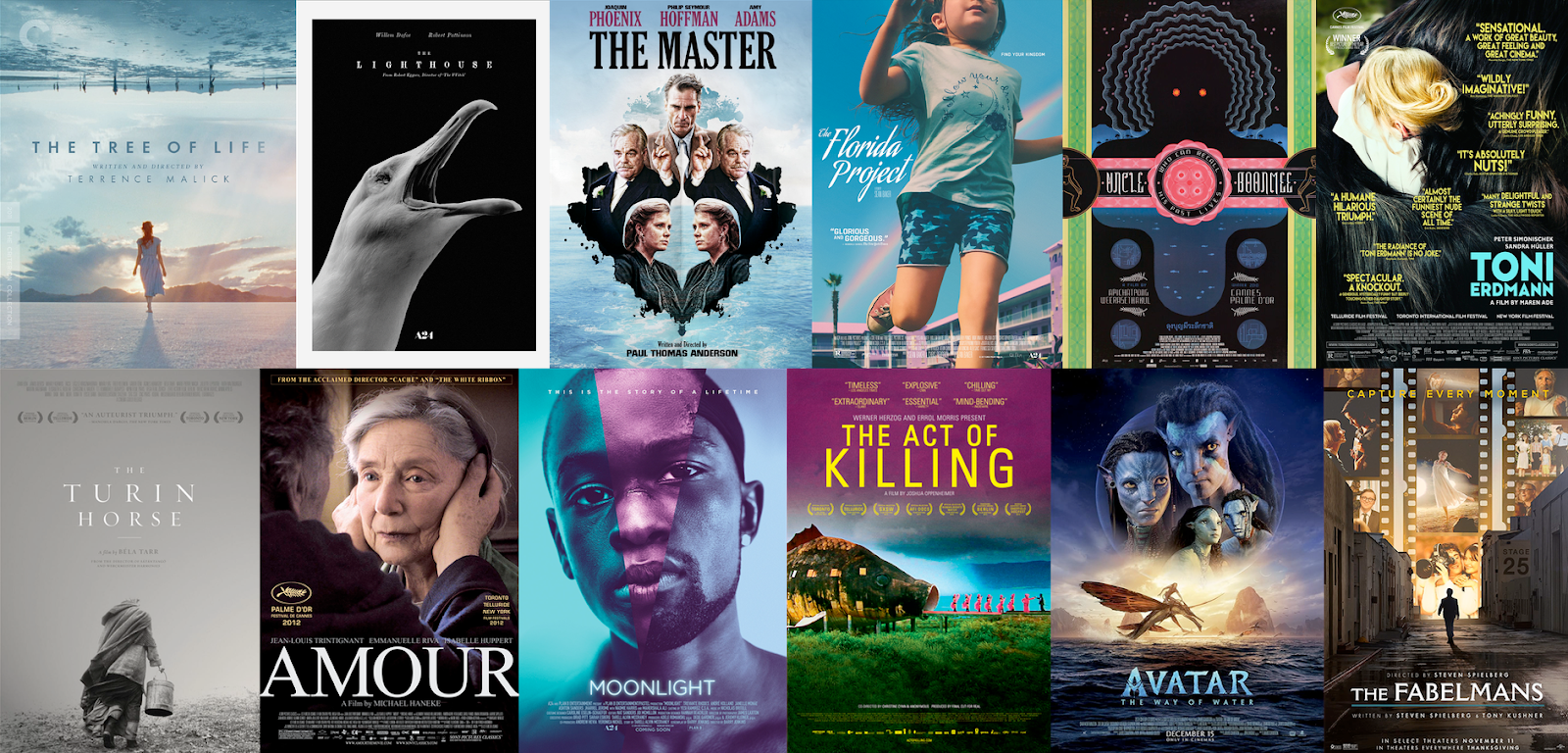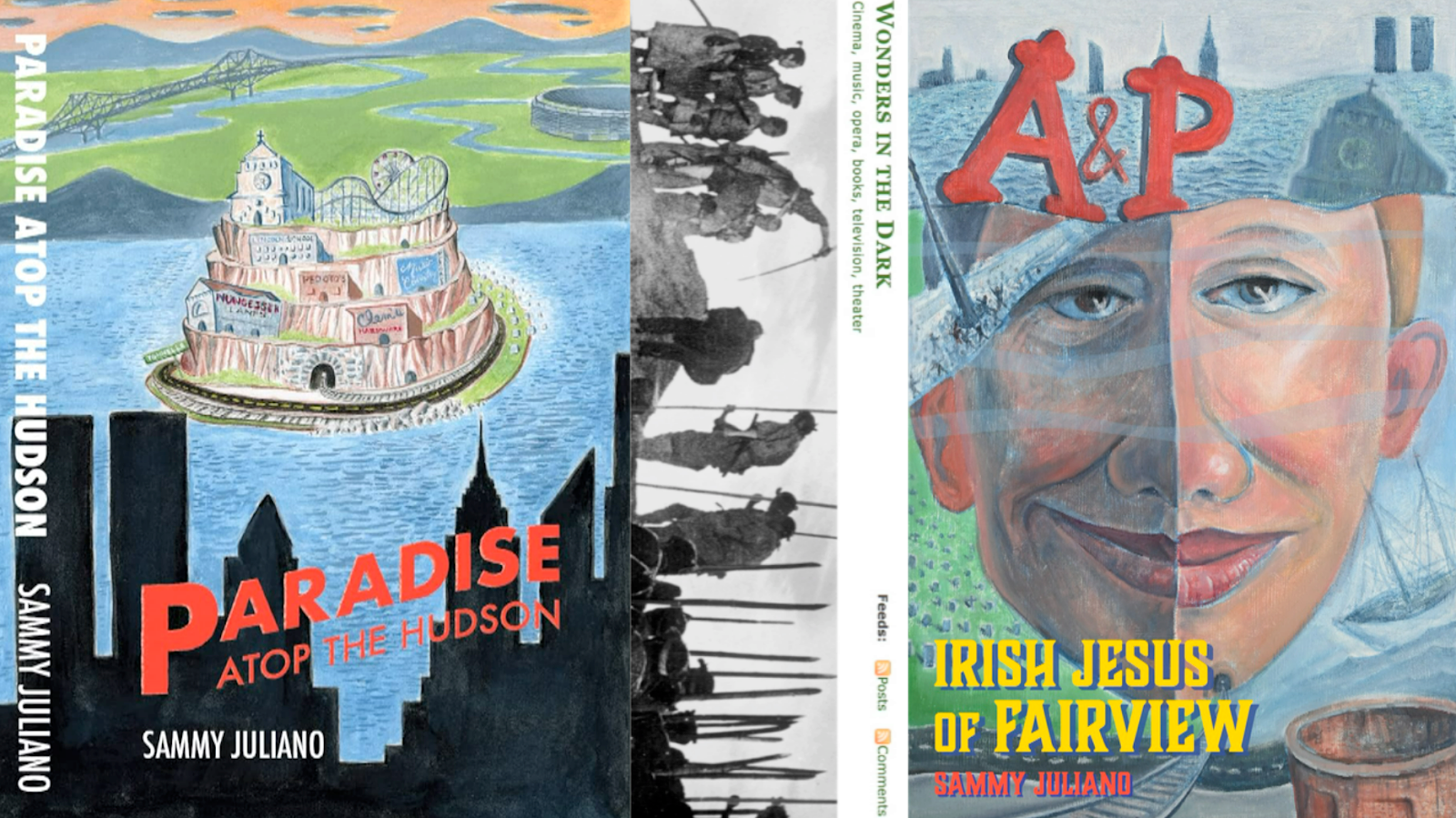LOST IN TWIN PEAKS #46: Season 3 Parts 17 & 18 (The Return - "The Past Dictates the Future" & "What Is Your Name?") podcasts & illustrated companion
Who Summons Ronette's Guardian Angel? • discussion w/ Creamed Corn and the Universe podcast
belated November 2023 Patreon round-up: EXCLUSIVE - Rob Zombie's Halloween & Halloween II + ADVANCE - TWIN PEAKS Character Series entry & public teasers for patron podcasts
Final Plan to reach & complete Journey Through Twin Peaks (keeping track)
belated October 2023 Patreon round-up: EXCLUSIVE - Star Trek & Star Wars: The Clone Wars viewing diaries & Podcast Episode 100 Films Reviews
FINAL Lost in the Movies Patreon podcast • Episode 100 - Concluding the 10s & Reaching the 20s w/ 12 Films in Focus: The Tree of Life as Twin Peaks Cinema, The Lighthouse w/ guest Riley MacDonald, The Fabelmans, Avatar: The Way of Water, Moonlight, The Master, The Act of Killing, Amour, The Florida Project, The Turin Horse, Uncle Boonmee Who Can Recall His Past Lives, Toni Erdmann, 40s/30s/silent archive readings of Kiss of Death, Bambi, The Magnificent Ambersons, Three Comrades, The Mind Reader, The Battleship Potemkin, The Cabinet of Dr. Caligari, Be Kind Rewind, Landmarks of Early Film + feedback & more
63 Up
Sight & Sound #14 Stalker (LOST IN THE MOVIES podcast #60)
Wonders of the Past and Present: Conversation w/ Wonders in the Dark's Sam Juliano, author of Paradise Atop the Hudson & Irish Jesus of Fairview (podcast)
The history of Sam Juliano's film (and wider arts) website Wonders in the Dark dovetails almost perfectly with my own. I launched The Dancing Image (the original incarnation of Lost in the Movies) in July 2008 while Wonders kicked off two months later in September. But Sam's appreciation of and engagement with the cinema began much earlier. In this conversation, we begin by discussing Sam's seventies and eighties cinephilia as well as his connection with his British complementary opposite Allan Fish whose decades countdowns launched a fruitful collaboration. (Sadly, an extended chat about Allan's persona and approach got lost in the midst of Zoom technical difficulties.) From there, we explore Sam's new novels Paradise Atop the Hudson and Irish Jesus of Fairview, which mix slice-of-life memoiristic details, melodramatic explorations of violent bullying, and eccentric navigations of cultural dynamics and gender presentations. Finally, we wrap up with a look at this current year and the recent era anchored by Sam's recent viewings and Oscar predictions. As I conclude my public film discussions on this site, this conversation provided a great opportunity to bring things full circle.
Reaching the Finish Line for Public Film Writing/Podcasts
Sight & Sound #11 Sunrise (LOST IN THE MOVIES podcast #59)
The Curious Case of Benjamin Button (The Unseen 2008)
The Story: "So we beat on, boats against the current, borne back ceaselessly into the past." The famous conclusion of F. Scott Fitzgerald's The Great Gatsby was literalized by the same author three years in the past (how appropriate) with his 1922 short story The Curious Case of Benjamin Button. And David Fincher's cinematic adaptation, based on a screenplay by Forrest Gump's Eric Roth (a connection hard to miss), literalizes this concept even further with actual floodwaters threatening the hospital deathbed of Daisy Fuller (Cate Blanchett) in 2005 New Orleans. As Hurricane Katrina bears down on the city where she spent much of her life, the eighty-two-year-old Daisy shares an anecdote, and then a diary/scrapbook, with her thirty-seven-year-old daughter Caroline (Julia Ormond). The anecdote relates the sad tale of Mr. Gateau (Elias Koteas), a clockmaker who was commissioned to create a grand timepiece for New Orleans' train station; grieving the recent loss of his son in World War I, Gateau's installation runs backwards, symbolically wishing for the return of those dead young men. The diary reveals that, around the same time - the night of Armistice Day to be exact - button manufacturer Thomas Button (Jason Flemyng) raced home through the jubilant end-of-war celebrations to find his wife (Joeanna Sayler) dying in childbirth. Horrified by the infant's appearance - the boy is a shriveled creature covered by wrinkles and wracked with arthritis, cataracts, and other ailments - Thomas flees his home with the baby in his arms, nearly tossing the child into the river before hiding him on the steps of a nursing home.
Harry Potter and the Half-Blood Prince (The Unseen 2009)
The Story: Far from the gothic fairy-tale setting of Hogwarts School of Witchcraft and Wizardry in the Scottish Highlands, wicked creatures are attacking ultramodern twenty-first century London. The fanatical Death-Eater cult - who use black magic in a campaign against sorcerers born to Muggles (non-wizard humans) - destroy the Millennium Bridge; no wonder the salty old Hogwarts headmaster Dumbledore (Michael Gambon) yanks his star pupil, Harry Potter (Daniel Radcliffe), away from a date with a waitress (Elarica Johnson) whom he's just worked up the nerve to ask out. Harry is needed to help save the world; romantic rites of passage can wait. And yet despite these apocalyptic stakes, Harry will spend the next days and/or weeks far from the metropolis calling out for his protection, instead helping Dumbledore recruit (and then spy upon) a former professor (Jim Broadbent), studying an old spell book altered by the mysterious "half-blood prince" in his remote academy, and - after all - navigating romances between and around himself, his friends Hermione Granger (Emma Watson) and Ron Weasley (Rupert Grint), and Ron's sister Ginny Weasley (Bonnie Wright). Distrustful of rival student Draco Malfoy (Tom Felton) and the imperious teacher Severus Snape (Alan Rickman), Harry eventually discovers that their perniciousness runs even deeper than suspected; collaborating to bring down Harry's mentor, they end up killing Dumbledore (with Snape revealing that he himself was the half-blood prince who wrote the spells Harry has been using). Harry concludes that he must hunt down the evil Voldemort - once upon a time the brilliant but resentful Hogwarts student Tom Riddle (Frank Dillane and Hero Fiennes-Tiffin), whom Dumbledore rescued from an orphanage. And Harry's friends insist on accompanying him on this quest.
Sight & Sound #9 Close-Up (LOST IN THE MOVIES podcast #58)
October status update: what's left for public film/TV commentary
Sight & Sound #7 Beau Travail (LOST IN THE MOVIES podcast #57)
September 2023 Patreon round-up: EXCLUSIVE - More thoughts on "Barbenheimer" & Podcast Episode 100 Feedback + ADVANCE - TWIN PEAKS Character Series entry
Farewell to Netflix DVD: the end of an era...
Sight & Sound #1 Jeanne Dielman, 23 quai du Commerce, 1080 Bruxelles w/ guest Ashley Brandt (LOST IN THE MOVIES podcast #56)
The Sight & Sound Top 100 Films: which have I discussed? Announcing a new miniseries... (LOST IN THE MOVIES podcast #55)
Catching Big Fish in Twin Peaks • group discussion w/ the "Twin Peaks Grammar" Artists Love Twin Peaks podcast (w/ guests Colin, Alison Ivy, Josh Minton, John Thorne)
August 2023 Patreon round-up: ADVANCES including Podcasts - Jeanne Dielman w/ guest Ashley Brandt, Beau Travail, Close-Up, Sunrise & 12 other "Films in Focus" including conversation w/ Riley MacDonald) and 1 TWIN PEAKS Character Series preview
Two Paths Forward in the Fall (status update)
TWIN PEAKS Character Series pause (& accidental post) + upcoming podcasts & more (Late Summer status update)
As you may have noticed, the TWIN PEAKS Character Series paused a week ago with the Musicians of the Road House entry, an omnibus round-up on the cusp of the top thirty which seemed like a good place to take a break. However, as you likely also noticed, the series then (quite accidentally) resumed - and skipped an entry! - on Wednesday, with a high-profile character ranked #29. That post was supposed to have been re-scheduled to early October but somehow slipped through the cracks and received significant traffic after its accidental publication, despite not being featured on the home page, linked on my blogroll, or promoted on Twitter. Since #30 had been skipped, I obviously couln't leave #29 in place once I realized the mistake. I've reverted it to draft mode and scheduled the replacement for early October. Apologies to those who bookmarked or didn't finish reading it yet but the entry will be back (with a different URL).
As for other site business, I've been hard at work on upcoming podcasts, most of which have been advanced already for $5/month tier patrons (on Sunday I'll link all these previews as part of my monthly Patreon round-up): film reviews which will, in the fall, either be shared with the lower tier or go public. These include my long-delayed Episode 100 of the Patreon podcast as well as a bonus public miniseries for my Lost in the Movies feed (which I presumed to conclude in June). The public Lost in the Movies episodes will feature the most highly-ranked titles not yet covered by me on the 2022 Sight & Sound "Greatest Films of All Time" list. And depending how this work goes in the next few days, I can hopefully start work on Journey Through Twin Peaks soon. Look for another status update in a week (maybe a couple weeks) with more details, and thanks for hanging in there.










.jpg)














